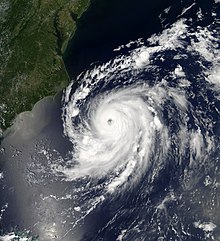 Chris nearing peak intensity east of The Carolinas on July 10 | |
| Meteorological history | |
|---|---|
| Formed | July 6, 2018 |
| Extratropical | July 12 |
| Dissipated | July 17, 2018 |
| Category 2 hurricane | |
| 1-minute sustained (SSHWS/NWS) | |
| Highest winds | 105 mph (165 km/h) |
| Lowest pressure | 969 mbar (hPa); 28.61 inHg |
| Overall effects | |
| Fatalities | 1 total |
| Damage | Minimal |
| Areas affected | East Coast of the United States, Bermuda, Atlantic Canada, Iceland |
| IBTrACS | |
Part of the 2018 Atlantic hurricane season | |
Hurricane Chris was a moderately strong tropical cyclone that affected the East Coast of the United States and Atlantic Canada in July 2018. The third tropical or subtropical cyclone, third named storm, and second hurricane of the 2018 Atlantic hurricane season, Chris originated from a frontal system that moved offshore the coast of the northeastern United States on June 29. The front evolved into a non-tropical low by July 3. After further organization, a tropical depression formed on July 6, several hundred miles south-southeast of Cape Hatteras, North Carolina. Two days later, the depression strengthened into a tropical storm and received the name Chris. Chris slowly strengthened as it drifted into warmer waters. These favorable conditions allowed Chris to rapidly intensify into a hurricane on July 10. The hurricane reached its peak intensity with winds of 105 mph (165 km/h) and a pressure of 969 mbar (28.61 inHg) at. This peak intensity was short-lived though, as Chris began to undergo extratropical transition. At 12:00 UTC on July 12, Chris became an extratropical cyclone well southeast of Newfoundland. The low continued northeastward over the Atlantic for the next few days, before weakening and finally dissipating southeast of Iceland on July 17.
Numerous marine warnings were issued for the East Coast of the United States. The storm brought high surf and rip currents to much of the East Coast. Dozens of beach rescues were reported in the Carolinas, and a coastal state park was closed in Massachusetts. A man drowned in North Carolina after being swept away in a rip current. Rainbands from the cyclone caused some minor rainfall in Bermuda. Chris also affected Atlantic Canada as an extratropical cyclone. Two oil drilling companies, BP Canada and ExxonMobil, had to call a temporary hiatus in drilling until after the storm passed. Swells of more than 10 ft (3.0 m) affected the coastline of Newfoundland and Labrador. Strong wind gusts and several inches of rain were reported. Overall damage was minimal.